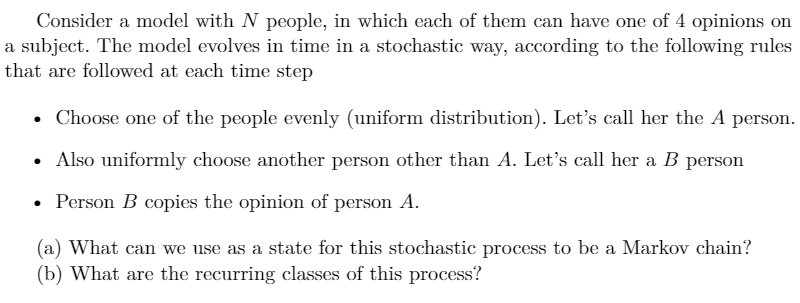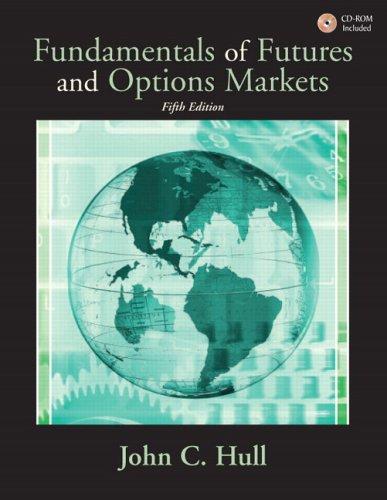Question
Hi, I'm posting this question again because I don't believe the first answer is correct. At least it doesn't make much sense to me. So

Hi, I'm posting this question again because I don't believe the first answer is correct. At least it doesn't make much sense to me. So I wanted to ask you to only respond if you really master the subject of stochastic processes.
I'll explain what I understand about the problem:
It appears to be an exercise associated with the voter model, with the difference of having 4 opinions instead of 2. In the voter model, we have as a state the number Nk of people who adhered to an opinion k, knowing that k is the opinion that dominates (ie in this exercise, person A would have the opinion k and the second person drawn would always or maintain an opinion A, or switch to an A opinion). And we have as recurrent states the absorbing states Nk = 0 (the number Nk being people with the opinion k) and Nk = N (i.e Nk = total number of people). But I don't know how to expand this problem to 4 opinions.
Consider a model with N people, in which each of them can have one of 4 opinions on a subject. The model evolves in time in a stochastic way, according to the following rules a that are followed at each time step Choose one of the people evenly (uniform distribution). Let's call her the A person. Also uniformly choose another person other than A. Let's call her a B person Person B copies the opinion of person A. (a) What can we use as a state for this stochastic process to be a Markov chain? (b) What are the recurring classes of this process? Consider a model with N people, in which each of them can have one of 4 opinions on a subject. The model evolves in time in a stochastic way, according to the following rules a that are followed at each time step Choose one of the people evenly (uniform distribution). Let's call her the A person. Also uniformly choose another person other than A. Let's call her a B person Person B copies the opinion of person A. (a) What can we use as a state for this stochastic process to be a Markov chain? (b) What are the recurring classes of this processStep by Step Solution
There are 3 Steps involved in it
Step: 1

Get Instant Access to Expert-Tailored Solutions
See step-by-step solutions with expert insights and AI powered tools for academic success
Step: 2

Step: 3

Ace Your Homework with AI
Get the answers you need in no time with our AI-driven, step-by-step assistance
Get Started


